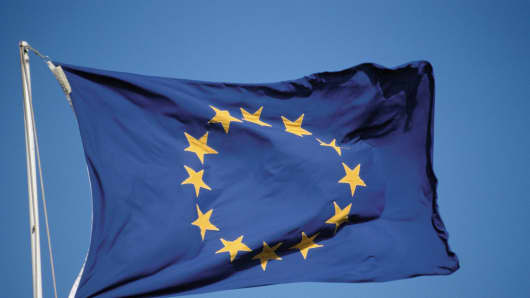A majority of European Union finance ministers voted on Tuesday to allow Germany, France and nine other euro zone countries to prepare to introduce a tax on financial transactions, said two officials who attended the meeting.
The vote clears the way for Germany,France, Italy, Spain, Austria, Portugal, Belgium, Estonia, Greece, Slovakia and Slovenia to press ahead with their own tax on trading.
"The decision on a financial transactions tax through enhanced cooperation was adopted," said one official at the talks."Britain, Luxembourg, the Czech Republic and Malta abstained (in the vote)."
(Read More: Worries Grow as Investors Pile Into Spain)
The levy, based on an idea proposed by U.S. economist James Tobin more than 40 years ago but largely ignored until now, is symbolically important in showing that politicians, who have fumbled their way through five years of financial crisis, are getting to grips with the banks blamed for causing it.
Some believe that the tax could raise up to 20 billion euros a year, although estimates vary widely.
Under EU rules, a minimum of nine countries can cooperate on legislation without all member states using a process called enhanced cooperation, as long as a weighted majority of the EU's 27 countries give their permission.
Germany and France decided to push ahead with a smaller group after efforts to impose a tax across the whole EU and later among just the 17 euro zone states foundered. Sweden, which tried and abandoned its own such tax, cautioned that the levy would push trading elsewhere.
Unintended Consequences
Critics are also concerned that the levy could open another rift in Europe, where the 17 states using the euro are deepening ties in order to underpin the currency, and there is the growing risk that Britain could even leave the European Union.
Britain has criticized the tax, and will not adopt it, as trading in the region's biggest financial center, London, will be affected. If either the buyer or seller in a trade is based in one of the countries imposing the tax, the levy can be imposed regardless of where the transaction takes place.
(Read More: Cameron Leading Britain Into Minefield on EU)
The tax's proponents, including German Finance Minister Wolfgang Schaeuble, believe it can tackle activity many deem speculative, such as high-frequency trading, by imposing a charge on every split-second deal.
But Nicolas Veron, a financial market expert at Brussels think-tank Bruegel, said the tax is misguided.
"There are so many things that we don't understand about the financial system, in much the same way that 17th-century doctors could understand a couple of things about the human body but not the whole picture," he said.
"Using a tax on financial transactions to tackle the ills of finance such as high-frequency trading could turn out to the equivalent to a 17th-century course of leeches."
Some countries are already counting on the new income, a welcome windfall for countries where shrinking economies and rising unemployment are sapping other tax income.
(Read More: Why the UK Jobs Number May Be Misleading)
Officials previously estimated that if the scheme were implemented across all 27 EU countries, it could raise 57 billion euros ($76 billion) a year. Estimates for the amount that could be raised from the 11 euro zone states vary widely.
Now that ministers have given the 11-nation plan the go-ahead, the next step is for the European Commission to redraft its plans for the tax.
It is likely to suggest taxing stock and bond trades at the rate of 0.1 percent and derivatives trades at 0.01 percent.


